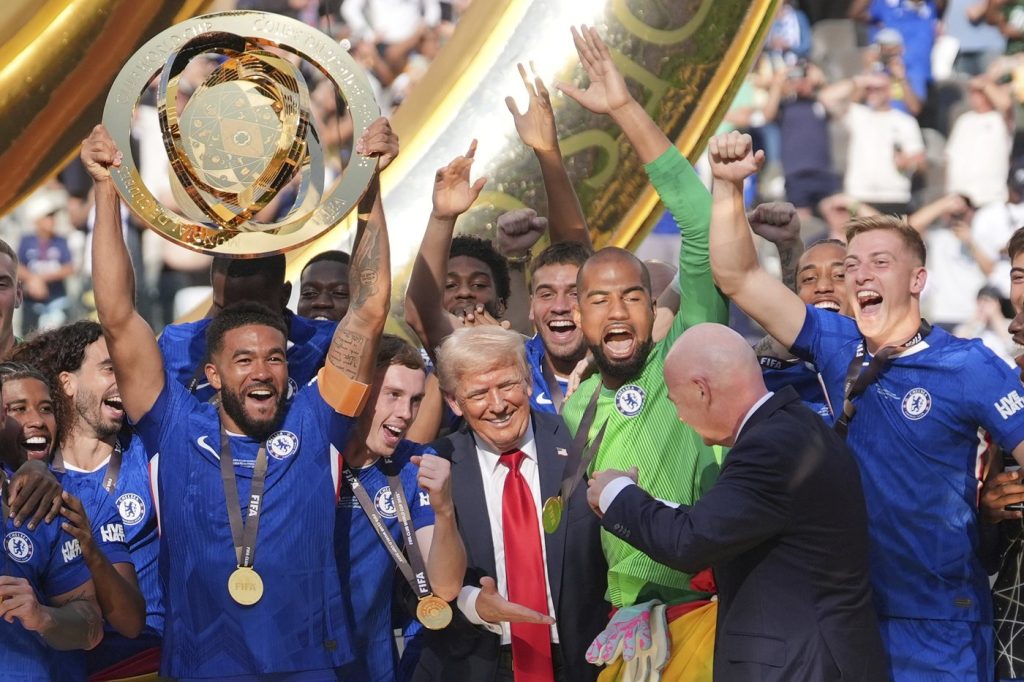The world’s most popular sport remains a topic of debate regarding its nomenclature, particularly in the United States, where it is referred to as soccer. This terminology was recently brought to light when U.S. President Donald Trump jokingly suggested he could issue an executive order to compel Americans to call it football during an interview while attending the Club World Cup final in New Jersey. "I think I could do that," he remarked with a smile.
This light-hearted comment has resurfaced ongoing discussions about why Americans opt for a different name, especially as the U.S. is becoming increasingly significant in the world of soccer. Currently, the United States is co-hosting the men's World Cup alongside Canada and Mexico in 2026, following its role in staging several major tournaments including the 2024 Copa America and the recent Club World Cup.
One major factor complicating this distinction is the other prevalent sport known as football in the U.S. Trump stated, "They call it football, we call it soccer. I'm not sure that change could be made very easily." As soccer continues to gain traction in the U.S., its visibility is heightened for various reasons, including the presence of legendary players like Lionel Messi in Major League Soccer (MLS) with Inter Miami. The growing popularity of leagues such as the Premier League and Champions League, along with culturally significant media like the documentary series "Welcome to Wrexham," co-owned by Hollywood actors Ryan Reynolds and Rob McElhenney, further contribute to this trend.
The term "soccer" has commonly been linked to the United States, yet it's important to remember that it originated from Britain in the 1880s. The word is believed to have been derived from "association football," which was the sport's first official name. According to English Heritage, the term may have first been utilized by students at the renowned Harrow School to differentiate it from their earlier games, commonly referred to as 'footer.'
Various forms of football were played in Britain, leading to the creation of the English Football Association in 1863, which established codified rules for associated football and gave rise to the modern game. Dr. Stefan Szymanski, a professor of sport management at the University of Michigan, explored the origins of the term in his book "It's Football, Not Soccer (And Vice Versa)," emphasizing that "soccer" is indeed a word of English origin.
While "soccer" may not be widely used in contemporary British vernacular, it was once considered interchangeable with "football." For instance, "Soccer AM" was a popular television show from 1994 to 2023 on Sky Sports, and Bobby Charlton's "Bobby Charlton’s Soccer School" implies that both terms were familiar and acceptable in British culture at various points in time.
Dr. Szymanski also pointed out that the discomfort surrounding the term "soccer" doesn't stem from the word itself but rather from its association with American culture. He commented that the reaction often arises when Americans use the term specifically, given that they have a different version of football in the NFL. With the immense popularity of American football, distinguishing between soccer and American football makes practical sense.
Interestingly, the usage of "soccer" varies in several countries. In Australia, where Australian rules football is popular alongside rugby, the term is commonly employed, and the national men's team is called the Socceroos, although its governing body is known as Football Australia. Similarly, in Ireland, where Gaelic football is prevalent, "soccer" is adopted, while its national team is regulated by the Football Association of Ireland.
In Canada, much like the U.S., the sport is referred to as soccer, helping to differentiate it from the Canadian Football League. The Associated Press stylebook advises that "soccer" is the favored term in the U.S. while acknowledging that internationally, the sport is primarily referred to as football.












